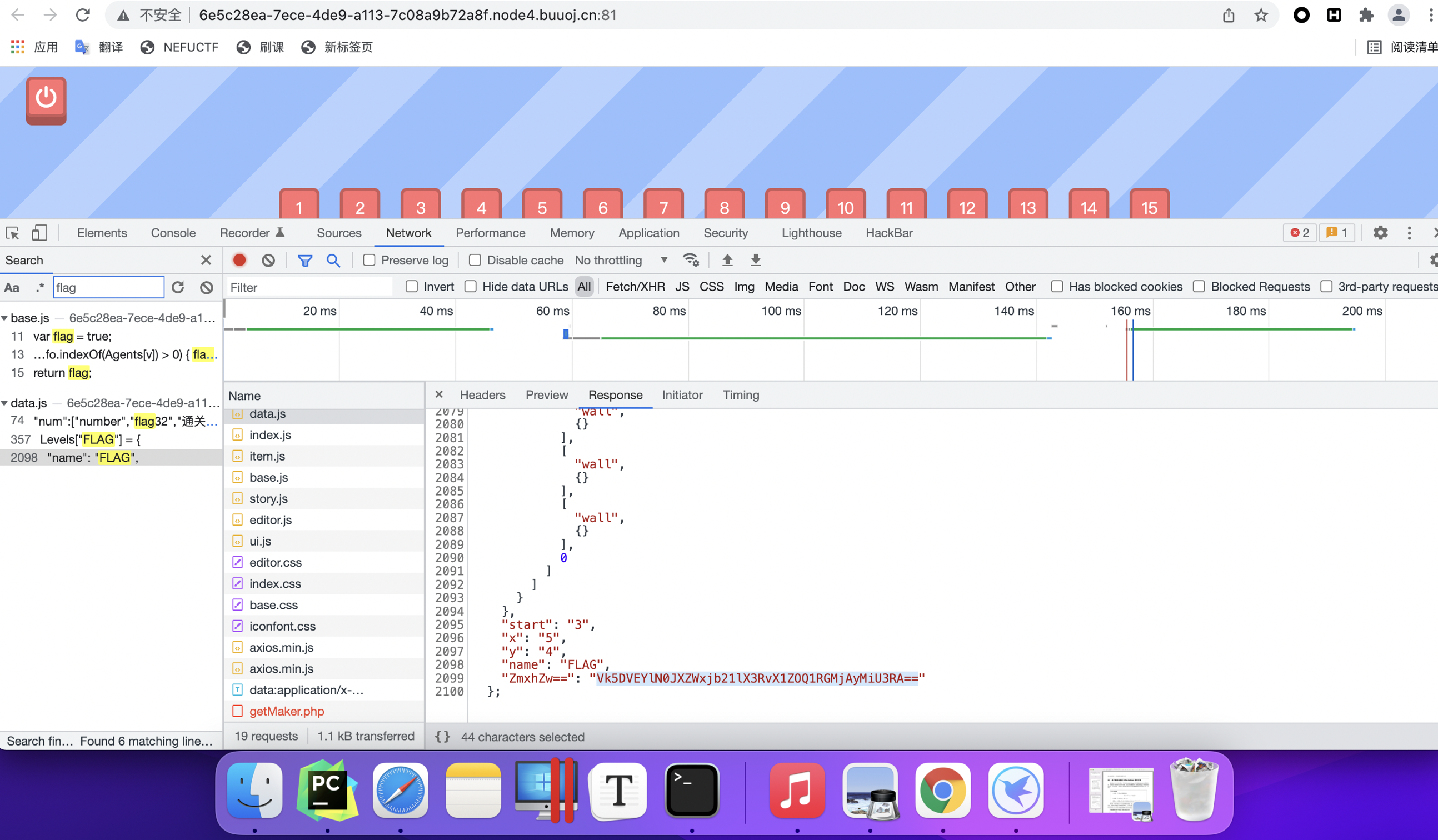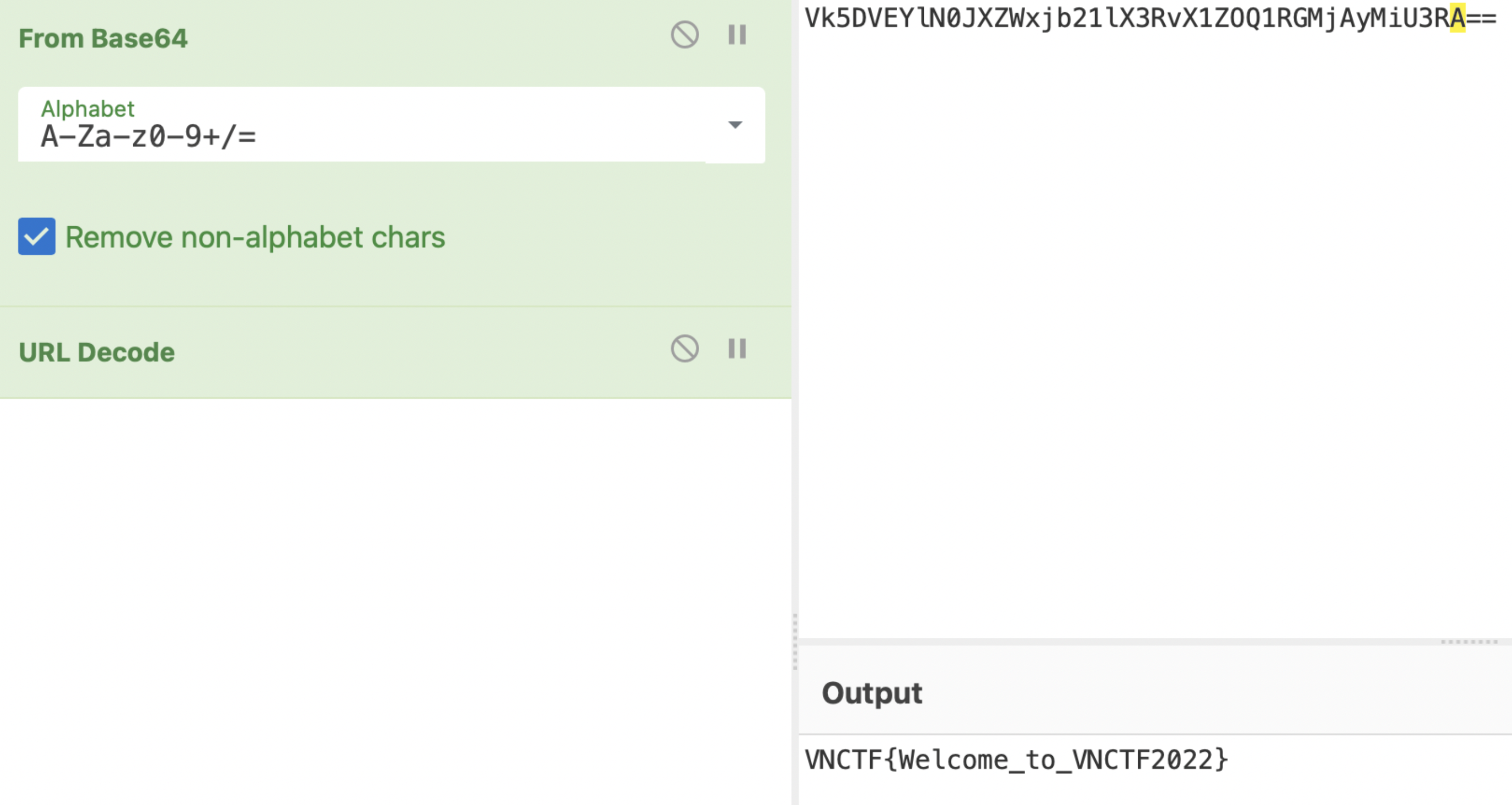VNCTF2022公开赛 Writeup
1. 个人信息
名称:0HB
排名:73
2. 解题情况
一道Crypto,总五道
一道Web, 总五道
两道Misc,总六道
其中Crypto方向第27名

3. 具体WP
MISC
题目一名称:仔细找找
步骤一
原图肉眼可得:VN???{34a?@w}
盲猜vnctf{…}
步骤二
改了下颜色,对着a之后、@之前看点是否连成线来确定“被遮挡住”的形状为E

vnctf{34aE@w}
题目二名称:问卷
步骤一
填完问卷即解。
Web
题目一名称:GameV4.0
步骤一
启动靶机,转到页面,审查元素

步骤二
- Base64解码
- Url解码

Crypto
题目一名称:ezmath
步骤一
启动靶机,下载server.py文件,连接(macOS)
1 | nc node4.buuoj.cn 25196 |
步骤二
1 | [+] sha256(XXXX+k7h8CNcM3jCpuivQ) == 7dbe1e6a592f589a44508d3cb5d72e87a2f653714109dd16d1d94ea461c59a9c |
连接后,可见四位的sha256爆破
上Python,写!
1 | import hashlib |
得到:UtFn,输入之。
步骤三
1 | plz give me the 3080090231th (n) that satisfying (2^n-1) % 15 == 0 (the 1st 2^n-1 is 15): |
(2^n -1 )% 15 == 0 ,即:
2的n次方-1 后除15 得 = 0,求满足该条件的第3080090231个n
推一遍
第一个除15得0的正整数是15,此时2^n -1=15,即:第一个n=4
第二个除15得0的正整数是30,此时n解不出正整数
第三个除15得0的正整数是45,此时n解不出正整数
第四个除15得0的正整数是60,此时n解不出正整数
….
第十七个除15得0的正整数是255,此时2^n -1=255,即:第二个n=8
…
这样,就知道了什么叫做求第X个的解n
计算机爆破
思路却不同以上,以计算机的思维,该如下:
1
2
3
4
5
6
7
8
9
10
11
12target = 3080090231
num = 0 # 第num个n
n = 1
while num != target:
n += 1
if (2 ** n - 1) % 15 == 0:
num += 1
print("num",num)
print("n", n)
print("第 {0} 个的解n为: {1}".format(num, n))运行到第百万位个n,用了三四分钟,现在十位数的要求,显然不可能直接爆破
观察数据,找规律
1
2
3
4
5
6
7
8
9
10
11
12
13
14
15
16
17
18
19
20
21
22
23
24
25
26
27
28
29
30
31
32
33
34
35
36
37
38num 0
n 2
num 0
n 3
num 1
n 4
num 1
n 5
num 1
n 6
num 1
n 7
num 2
n 8
num 2
n 9
num 2
n 10
num 2
n 11
num 3
n 12
num 3
n 13
num 3
n 14
num 3
n 15
num 4
n 16
num 4
n 17
num 4
n 18
num 4
n 19
num 5
n 20可见:
第1个n:4
第2个n:8
第3个n:12
第X个n:4*X
输入12320360924(4*3080090231)
步骤四
1 | You are so smart! |
看server.py代码
可见,并不是解出一个来就给flag,我们得知道判定条件
1
2
3
4
5
6
7
8
9
10
11
12
13
14
15
16for i in range(777):
times = getPrime(32)
self.send(b'plz give me the ' + str(times).encode() + b'th (n) that satisfying (2^n-1) % 15 == 0:')
n = int(self.recv())
a , ret = check(times,n)
if a == True:
self.send(ret.encode())
counts += 1
else:
self.send(ret.encode())
if counts == 777:
self.send(b'You get flag!')
self.send(flag)
else:
self.send(b'something wrong?')
self.request.close()得知:要解此问777次可得flag
-
学习后,依次写代码
先是sha256爆破
1
2
3
4
5
6
7
8
9
10
11
12
13
14
15
16
17
18
19
20
21
22
23
24
25
26
27
28
29
30
31
32
33
34
35
36
37
38
39
40
41
42import socket
if __name__ == '__main__':
HOST = 'node4.buuoj.cn'
PORT = 28158
s = socket.socket(socket.AF_INET, socket.SOCK_STREAM)
s.connect((HOST, PORT))
data = ''.join(str(s.recv(1024)).strip("\n"))
sha_key = data[18:34] # like: dygRhRVGRA146H43
sha_data = data[39:103] # like: d06a5396ad875acdf0796cc5b0c083170e38728847085cfd99dadaeda71a3d17
import hashlib
import re
# 第一关 sha256
def decry(data):
s = hashlib.sha256() # Get the hash algorithm.
s.update(data.encode()) # Hash the data.
b = s.hexdigest() # Get he hash value.
return b
list1 = ["A", "B", "C", "D", "E", "F", "G", "H", "I", "J",
"K", "L", "M", "N", "O", "P", "Q", "R", "S", "T", "U", "V", "W", "X", "Y", "Z", "a", "b", "c", "d", "e", "f", "g", "h", "i", "j", "k", "l", "m", "n", "o",
"p", "q", "r", "s", "t", "u", "v", "w", "x", "y", "z", 0, 1, 2, 3, 4, 5, 6, 7, 8, 9, ]
def yi():
for a in list1:
for b in list1:
for c in list1:
for d in list1:
flag = "{0}{1}{2}{3}{4}".format(a, b, c, d, sha_key)
flag_sha = decry(flag)
flag1 = flag[0:4]
print(flag1)
if str(flag_sha) == str(sha_data):
print('恭喜!')
return str(flag1)
s.send(yi().encode())后是没夸你真睿智🤔的那次求n
1
2
3
4
5
6
7
8
9s_ = s.recv(1024)
# 进入第二关
# b'plz give me the 2832346159th (n) that satisfying (2^n-1) % 15 == 0 (the 1st 2^n-1 is 15):\n'
target = str(s_)
target = target.split('th')
target = target[1][2:]
s.send(str(int(target)*4).encode())再是剩下776次
这里发现接受一次(s_ = s.recv(1024)),有时只返回You are so smart,不给题,导致报错。
对此,写if判断,此时再接受一次(s_ = s.recv(1024)),得到题目
1
2
3s_ = s.recv(1024)
if str(s_) == r"b'You are so smart.\n'":
s_ = s.recv(1024)循环接受题目,发送解答,利用正则表达式捕捉题目要求num
1
2
3
4
5
6
7
8
9
10
11import re
for i in range(778):
s_ = s.recv(1024)
if str(s_) == r"b'You are so smart.\n'":
s_ = s.recv(1024)
s_ = str(s_)
print(s_)
reg = r'\d\d\d\d\d\d\d\d\d\d'
target = re.search(reg, s_)
target = target.group()
s.send(str(int(target) * 4).encode())这里循环给多一些,报错了自动停止(多多益善,反倒是少了会功亏一篑
:(
总代码
1 | import socket |